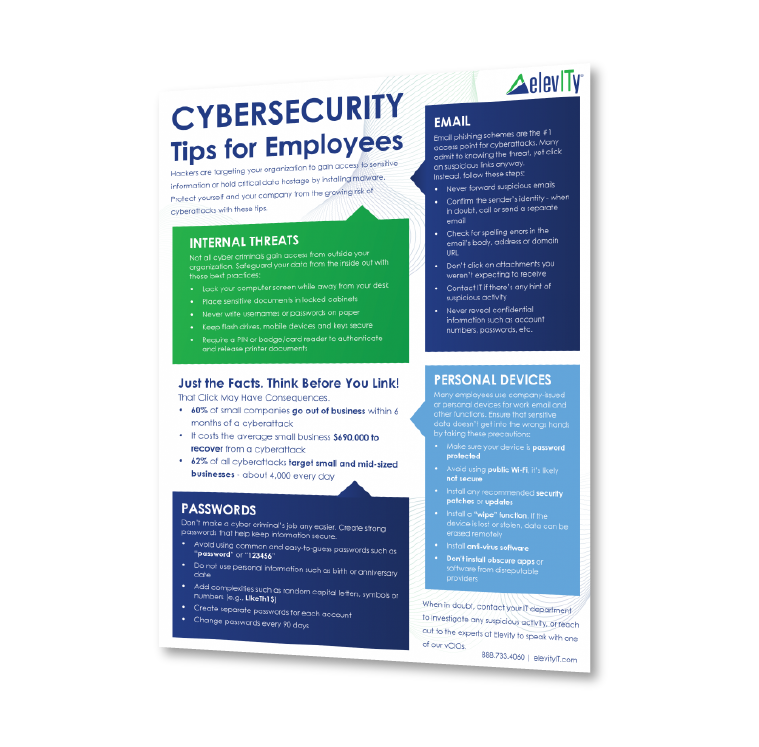Since remote work is becoming less of a short-term phenomenon and more of a long-term trend, it’s important to look at how you can improve your technology for greater security, connectivity, and productivity in a work-from-home world.
As a virtual CIO, I help businesses prepare themselves for tomorrow by making smart IT decisions today. So if you're gearing up for more remote work, here are a few of my recommendations.
Establish Smart Policies
Policies are very important and a good place to start. Think about your organizational IT policies. What are you doing to ask users to safeguard your data and other electronic assets?
You need policies in place that determine:
- Where data goes
- How data is stored
- What data is used
- Who data is shared with
And it’s not just IT policies you need to consider. Review the IT decisions you made in the heat of the moment when you had to quickly get employees working remotely. Let’s use Microsoft 365 as an example.
At many companies, a lot of light switches in the Office 365 management console had to be flipped on quickly without a full understanding of their ramifications. Go back and make sure you understand the Microsoft 365 policies and the impacts of having a switch on like “Enable to share files with users outside my organization.”
Conduct Security Awareness Training
Remote work is a breeding ground for threat actors to take advantage of the more relaxed attitudes that can go along with working from home. We’re at home in our sweatshirts and we might not be as cautious about opening emails or clicking links as we were in our cubicles.
Any security mistake – whether it’s on a tablet, personal computer, or work laptop – could endanger your entire home network. If your home computer is the victim of a hack, that can ripple outward to damage everything else in your home that’s connected to your internet.
Getting your employees to participate in security awareness training is a MUST. An employee needs to be thinking about their entire home network, not just their work laptop. Establish an effective training program and ensure everyone is actually doing the training.
Expand Your Advanced Endpoint Protection
Your remote employees’ home networks are a new ecosystem that isn’t fully under your control. So IT leaders and business owners need to look at tools that can extend the protections available at the physical office out into a user’s home environment.
One such tool is content filtering. Say you click on a news article. At the office, there are tools in place that watch that activity and say, “no, we’re not going to let you go there because it’s actually ransomware.” At home, those tools don’t necessarily exist. You should ensure your employees have content filtering on their work laptops. This can keep them from drifting into what I call “dark alleys” that users don’t realize are bad places to visit.
If I was a business owner, I’d think about what solutions I can put in place to expand the cyber safety net around my employees’ virtual environments as well as the physical office.
Create a Best Practices Guide
Large or small, every organization should consider creating a best practices guide for their employees at home. It should include special recommendations for any unique requirements your company has. For instance, maybe your business conducts lots of meetings, so you want to recommend that employees upgrade their internet service from 200 Mbps to 400 Mbps.
That’s just one example. Your best practices guide should explain how employees can perform well and safely while at home.
Set Up an Internal Help Desk
If you have your own IT department, consider setting up an expanded help desk or “tech bar” to handle questions about home networks.
If your employees feel comfortable coming to your IT department with questions, you’re going to get a question in there somewhere that you’ll be REALLY glad someone asked. You’re creating an atmosphere of trust and openness where it’s ok to ask questions because you’re there to help. Sometimes I think IT departments are traditionally against being bothered by someone’s home issues. But in a world of remote work, even the most mundane question from a remote worker can have an impact on your entire system.
Ask for Help
Remote work is a new frontier for many organizations. It’s ok if you don’t know all the answers. An experienced managed IT provider like Elevity can give you the guidance and support you need to create a successful remote work environment for your organization.








%20cropped.jpg)





